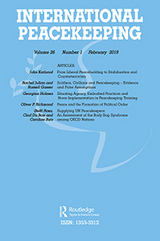
First peace, then democracy? Evaluating strategies of international support at critical junctures after civil war
Mross, KarinaExternal Publications (2019)
in: International Peacekeeping 26 (2), 190-215
DOI: https://doi.org/10.1080/13533312.2018.1557052
Open access
Existing research suggests that democratization can run counter to building peace in post-conflict contexts. This article analyses the effect of two competing strategies that external actors use to address the conflict of objective between democracy and peace: prioritization and gradualism. The prioritization approach advises sequencing, which means postponing support for democratization and concentrating first on peace in terms of the absence of violent conflict. The gradualist approach promotes peace and democracy simultaneously. This article offers a systematic analysis of these two prominent donor strategies. To this end, it focuses on two critical junctures in two similar post-conflict settings (Burundi and Nepal). Drawing upon extensive field research, the analysis shows that a gradualist approach is not more risk-prone than a prioritization strategy. To the contrary, the analysis suggests that even in most fragile contexts, gradualism can help to foster peace. Prioritization, in turn, may also contribute to the instability it aimed to prevent. Two factors condition the effect of the selected strategy on peace: which dimensions of democracy are affected and to what degree, and whether the institutional context reinforces or counteracts this trend.

